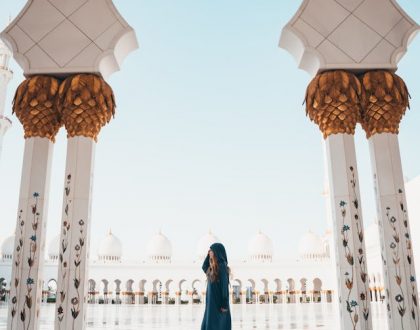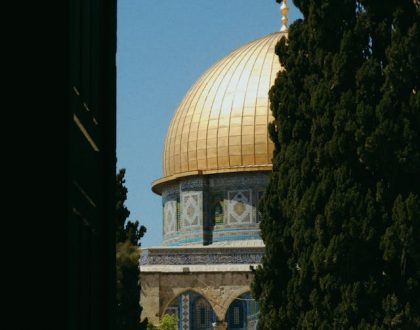Five actions that guarantee Jannah

Spread the salam, be good to family, feed others and pray in the night
Abdullah bin Salam (may Allah be pleased with him) narrated that the Messenger of Allah (peace be upon him) said:
“O people, extend greetings (saying Salam to each other), keep relations with your kin, provide food (to people) and pray at night when people are asleep and you will enter Paradise in peace.” [Imam Tirmidhi]
Speech of a true leader
This hadith is very short – just two lines in Arabic but is part of a longer story. This beautiful hadith is one of my favorites for many reasons. Firstly it is the very first instruction the Prophet (peace be upon him) mentioned in Madinah, upon his arrival after the migration.
It’s like the opening speech for a new president, a new prime minister, or new king etc. but in fact of even greater importance because it is the foundational advice of the Prophet (peace be upon him). Let’s explore the gravity of the hadith, the scene, context, and timing.
The Prophet (peace be upon him) was addressing a mixed community of believers, non-believers, therefore some who were supportive and some who were not. Yet, he did not start his speech by saying ‘O you who believe’, but ‘O people’ because he was including everyone.
It is important when you have any ruler, particularly rulers who are charge a mixed community, such as believers and non-believers, or mixed races, that they are a ruler for their whole community, not biased towards a certain faction within that society. They have to be just rulers, who rule with absolute fairness and justice.
Yet in our reality, particularly at election time, we have mainly two or three parties fighting to get into the position of authority in their country. These parties fight and then one of them are elected and the leader of the party becomes the prime minister or President, as in the UK, the US, and many European and western countries.
No matter which party they belong to, once they are in power, they are the Prime Minister or President for the whole country, not just their party – they are the leader of everyone and this should be evident in policies.
Background of when the speech was made
During the rule of the Prophet (peace be upon him) in Madinah, there were five tribes – Al Aws and Al Khazraj, who were Arabs and in addition Banu Nadir, Banu Qainuqa and Bani Quraydha.
The Prophet (peace be upon him) therefore, when he was delivering his speech was addressing all the people, regardless which tribe they belonged to not just his supporters. Indeed he had been sent not just to the people of Madinah, but to all humanity.
Allah Almighty did not sent Islam for Muslims, Allah sent Islam for humanity. Allah is calling upon every human to embrace Islam and follow Islam. Thus the opening speech of the Prophet (peace be upon him) sets the foundation of all human societies, not just for Arabs, or the people of Madinah. It’s not limited to time and place. These foundations are obligatory foundations. If you want to run a society which is built on fairness, love, care, an harmonious society then you need these foundations otherwise you will see the consequences of not doing that.
The Narrator
Abdullah bin Salam was a Jewish rabbi. When the Prophet (peace be upon him) arrived in Madinah the rabbi’s name was not Abdullah but Iman Saleh Hussain, so the Prophet (peace be upon him) gave him this new name, Abdullah. Imam Dhahabi and Hisham, in his beautiful book, mentioned his biography.
Imam Suyuti and other scholars have written short booklets on people, places and things whose names were changed by the Prophet (peace be upon him). There have even been some research, PhDs and Masters on this topic. Imam Suyuti collected the names of about 80 people, (men and women) whose names were changed, including Abdullah bin Salam. The change was to give them a better, easier and more blessed name.
Purity of Abdullah bin Salam
Abdullah bin Salam, as mentioned in Tirmidhi and others, was waiting for the arrival of the Prophet (peace be upon him). One day he was on his palm tree, fixing it when news came to him that the Prophet (peace be upon him) had arrived. His paternal aunt Halida, paternal aunt, was next to the palm tree. When he heard the news he exclaimed ‘Allah Akbar’. His aunty was surprised, and said, ‘If you were to hear about Musa you won’t exceed this.’ He replied, ‘He is the brother of Musa; he has come with the same message as Musa.’ He was so excited he went to see the Prophet (peace be upon him) and as soon as he saw him he could tell that his was not the face of a liar. This reflects the purity of Abdullah bin Salam, that he was able to see the nur (divine light) of prophethood emanating from the Prophet (peace be upon him). In contrast to Abu Jahal and Walid ibn Mugheera, and Abu Lahab in Makkah, who did not want to see it because their hearts were intoxicated with arrogance, ignorance and envy etc.
Abdullah on the other hand, was pure hearted, and longing to see the truth, and meet the promised messenger and hear the message. This is why so many Jewish people had settled in Madinah, because their book had predicted that the Final Messenger would reside there. They assumed that as all their previous messengers had been Jewish, the Final Messenger would be from their tribes, so they settled awaiting his arrival and many Jewish people lived very close to Madinah or on its outskirts.
Abdullah bin Salam was longing to see this Final Messenger. He could not wait and said, ‘I’ve seen people rushing to see the Prophet (peace be upon him); I went with them.’ Then he set eyes on the face of the Prophet (peace be upon him) and it was a very special moment – his first impression. As many people feel awe when they see the majesty of the Kaaba for the first time and light entering their heart, Abdullah bin Salam felt his heart melt when he saw the Prophet (peace be upon him). How we envy all the Companions of the Prophet (peace be upon him), as they were able to see him and enjoy his company, be next to him, hear his voice, and pray behind him.
Abdullah bin Salam knew immediately that his face was ‘not the face of a liar’. There was undoubtedly a special light emanating from the Prophet (peace be upon him), because he was the messenger of Allah, which could be seen by those who had a pure heart. Those whose hearts were receptive saw it beaming and shining everywhere; but those who decided to close their eyes, refused to see it.
Abdullah bin Salam was able to see that light and went to see him afterwards. He asked him a few questions and the Prophet (peace be upon him) answered them. Without any hesitation, he announced his shahada but asked the Prophet (peace be upon him) not to announce it to his people, because the were very arrogant and vicious.
Instead he asked the Prophet (peace be upon him) to invite them to come to his mosque and asked them who Hussain bin Salam was. When they were asked, they replied that he was the most knowledgeable and pious amongst them, and the son of the most righteous person among them. When the Prophet (peace be upon him) followed up by asking them what they would say if they learned that he had become Muslim they said it was impossible. He asked them three times, and they were adamant that such a thing could never happen. Then Abdullah bin Salam came before them and declared that he had indeed accepted Islam and that the Prophet (peace be upon him) was the messenger they were awaiting from their book.
Suddenly the atmosphere turned hostile towards him and they started insulting him and exclaimed that he was the worst person amongst them, the son of the worst person among them. Abdullah bin Salam turned to the Prophet (peace be upon him) saying, ‘This is what I was afraid of.’
In some narrations the Prophet (peace be upon him) promised Abdullah bin Salam Jannah.
Hadith
In this hadith, we see four commands:
- extend greetings of peace
- have good relations with your family
- provide food
- pray during the night whilst people are sleeping
There is a further command in another narration, recorded in Tirmidhi, that the Prophet (peace be upon him) said, ‘Worship Ar Rahman’. These are the 5 things scholars have called the ‘reasons or conditions for enteringJannah’.
Worship Ar Rahman
The importance of worshiping Allah Almighty is indisputable. Any society has to be connected to Allah Almighty. Worshipping of Allah is the very purpose of the creation of humans and jinn, to know Him, to obey Him and to follow His commands. Otherwise we are at the mercy of our whims and desires and our own ego (nafs) etc. If you have no guidance, you create your own guidance, but Allah has sent us guidance and told us ‘Follow the guidance, worship Ar Rahman.’
Give Salam
The second command the Prophet (peace be upon him) is mentioned is ‘greet with peace’. There is an abundance of narrations regarding the etiquettes of saying salam – including how to greet passersby, elders, children, those who are seated, those who are standing and even those who are in their vehicles.
When the migrants from Makkah to Madinah arrived, the community became mixed with the cultures of the refugees and the culture of the indigenous tribes, which was different from Makkah, even though they were all Arabs. With the influx of foreigners the Prophet (peace be upon him) wanted everybody to feel connected and the newcomers to feel they belonged. Therefore the salam was not to be exclusively for those who knew each other but extended to everyone whether they were familiar or strangers. In another narration it says, ‘greet whom you know and those whom you do not know’.
When you are greeted you feel an instant connection – at ease, acknowledged, and that is why it is a sign of peace. The salam spreads warmth when we arrive anywhere, here or abroad. When you are greeted with a cheerful face, it makes you feel happy. Whereas when you are ignored or met with a frown you feel distant and uncomfortable. That is why the Prophet (peace be upon him) wanted the community to welcome each other and greet each other.
In another narration, the Prophet (peace be upon him) said:
‘Shall I tell you about something that if you were to do it will foster love among you? Spread salam among you, this will foster love.’
The Prophet (peace be upon him) wanted to create a community where people loved one another, had pure hearts and good relationships. Sadly this is missing in our cities today. We need to work on this, especially in cities like London, where greeting someone is so uncommon that it is met with suspicion. Unlike cities in the north of England for instance, where people are often friendlier.
In any community, if you want love to be fostered among people, it begins with the salam. Whenever you meet somebody, or notice a new person in the community say salam, welcome him and make him feel at home.
Connect with family
The Prophet (peace be upon him) taught us to keep good relations with our family. Our family has two circles –parents, siblings, grandparents form the inner circle along and the outer circle is the extended family. We have to maintain good relations with them.
Although the communities in Madinah were mostly from the same background and had lived together for a long time, they were constantly at war with each other. Al Aws and Al Khazraj had been fighting for many years and four years before the Muslims arrived they had had a brutal war, which wiped out half of the population of Madinah. In addition there was still animosity between family members, so the Prophet (peace be upon him) was saying that it was important to connect with family, maintain good relations with them, forget about the past, and open a new page.
We may not have gone through war, but many families are fractured by in-fighting and politics. We need to get past this and move forward with civility and good relations. The reward for having good relationships with your family are huge.
Aisha reported that the Messenger of Allah (peace be upon him) said:
عَنْ عَائِشَةَ قَالَتْ قَالَ رَسُولُ اللَّهِ صَلَّى اللَّهُ عَلَيْهِ وَسَلَّمَ الرَّحِمُ مُعَلَّقَةٌ بِالْعَرْشِ تَقُولُ مَنْ وَصَلَنِي وَصَلَهُ اللَّهُ وَمَنْ قَطَعَنِي قَطَعَهُ اللَّهُ
“The bond of family is suspended from the Throne and it says: Whoever upholds me, Allah will uphold him. Whoever severs me, Allah will sever him.” [Bukhari and Muslim]
This is very clear having a good relationship with your family is critical because every society, and country rests on the smaller cell, which is the family. These are the building blocks of a civilization. And the strength or the weakness of the families impact the strength or weakness of their nation. Good, strong bonds within a family lead to a healthy family, healthy society, healthy city, country, and economy. The repercussions are political, social and religious.
We can see that the advice is very deep and comprehensive. If we neglect this obligation, we have trouble in our community, in our lives. A healthy family creates leaders, innovators, people of confidence and productivity. A disconnected family creates the reverse. We might have some exceptions but a family which is not functioning properly usually filled with animosity. It goes without saying that this toxic atmosphere is poisonous for children and they will inherit it and pass it onto their children. Therefore the more we work on the stability and soundness of the family, the better the outcomes. If we want to create a sound, harmonious and good community then this is what we should be doing focusing on the Prophet (peace be upon him) advice.
Provide Food
The fourth command is to provide food, which is symbolic for looking after those who are in need in the community. The main thing for those in need to survive is food and drink and shelter especially in winter. We need to support and help each other and this is a reflection of good character and mercy in our heart. You don’t just pass by somebody who is really in need and ignore them.
Especially in the context of migrants arriving from Makkah to Madinah, having left their homes and possessions behind. They had nothing but they found a very welcoming community – Al Ansar. Al Ansar provided them with houses, food, produce, and money. The Prophet (peace be upon him) said, ‘if all people were to follow a path and Al Ansar were to follow a path I will follow the path of Al Ansar’.
This shows how much he appreciated their support towards the Muhajirin. He never forget this and remained with them till he died. Even when he could have returned to Makkah after the Conquest, he stayed with them to thank them for their generosity.
Don’t be selfish. Don’t just focus on yourself. By default we love our own self but we need to learn how to love others because this will elevate our status with Allah Almighty. We need to have a big heart and not just focus on I, me and myself. The Prophet (peace be upon him) said,
‘None of you believes until he loves for people what he loves for himself.’ [Imam Ahmad
‘None of you believe until he loves for his brother what he loves for himself.’ [Bukhari and Muslim]
This means that we have to look after not just our brother in Islam, but our brother in humanity – being good to others is a sign of belief. Altruism is sharing food even if you only have a limited amount. Allah will put the barakah it.
The advice is aimed at making the community active, inwardly and outwardly and this is the true community of believers – active spiritually, as well as communally and in the mosque, not only during the day but also during the night.
Night Prayers
The last piece of advice is to ‘pray during the night whilst people are asleep’. Although salah was revealed as an obligation in Makkah 18 months before Hijra (migration) salah is the core of our relationship with Allah. Does ‘pray during the night’ mean Isha prayer because it is the last prayer? It could be. The Prophet (peace be upon him) is saying pray during the night as this obligation prayer that has never been given to any other ummah.
The Prophet (peace be upon him) said in a hadith when he was addressing the Companions, who were waiting for Isha prayer,
Abdullah bin Umar (may Allah be pleased with him) reported:
عَنْ عَبْدِ اللَّهِ بْنِ عُمَرَ، قَالَ مَكَثْنَا ذَاتَ لَيْلَةٍ نَنْتَظِرُ رَسُولَ اللَّهِ صلى الله عليه وسلم – لِصَلاَةِ الْعِشَاءِ الآخِرَةِ فَخَرَجَ إِلَيْنَا حِينَ ذَهَبَ ثُلُثُ اللَّيْلِ أَوْ بَعْدَهُ فَلاَ نَدْرِي أَشَىْءٌ شَغَلَهُ فِي أَهْلِهِ أَوْ غَيْرُ ذَلِكَ فَقَالَ حِينَ خَرَجَ “ إِنَّكُمْ لَتَنْتَظِرُونَ صَلاَةً مَا يَنْتَظِرُهَا أَهْلُ دِينٍ غَيْرُكُمْ وَلَوْلاَ أَنْ يَثْقُلَ عَلَى أُمَّتِي لَصَلَّيْتُ بِهِمْ هَذِهِ السَّاعَةَ ” . ثُمَّ أَمَرَ الْمُؤَذِّنَ فَأَقَامَ الصَّلاَةَ وَصَلَّى .رواه مسلم.
We waited one night in expectation of the Messenger of Allah (ﷺ) for the last prayer of the night, and he came out to us when a third of the night had passed even after that. We do not know whether he had been occupied with family business or something else. When he came out he said: You are waiting for prayer, for which the followers of no other religion wait except you. Were it not a burden for my Ummah, I would have led them (in the ‘Isha’ prayer) at this hour. He then ordered the Mu’adhdhin (to call for prayer) and then stood up for prayer and observed prayer. [Muslim]
Or it could be the non-obligatory night prayer, the qiyamul layl. During this time you have one to one relationship with Allah. It’s the vertical dimension rather than the horizontal dimension.
Energy is generated in the heart from its connection to Allah Almighty through the night prayers, the day prayers, dhikr of Allah, reciting the Quran, istighfar, and daily accountancy and asking Allah for forgiveness for shortcomings etc. These are the charge you up more than a lithium battery.
Allah gives us special power from Him during the salah, especially salatul layl because it’s away from the world’s gaze, and private between you and Allah Almighty and this is sincerity. You can appeal to Allah for support and whatever you want – all your needs, for yourself, your family, your parents, your rizq, facilitation, protection, healing, etc.
Whilst people are sleeping you are praying and connecting to Allah.
The rewards for doing these five things is being admitted to jannah peacefully or receiving the salam on entering Jannah.
Insha’Allah when we are all admitted to jannah the angels will greet all of us ‘assalam’kum’ or Allah will greet us ‘assalam’kum’ Insha’Allah all of us will receive this salam from Allah Almighty and from His angels.
Shaykh Haytham Tamim – Sunday Hadith Class
Transcribed by Rose Roslan
[1] The Prophet (peace be upon him). ‘Qul innama ana bashurum mithlukum yu haya ilaha’ at the end of Surat al-Kahf; ‘I’m just like a human like you who received the revelation.’

Recommended Posts

The consequences of harming Awliyaullah
May 03, 2024

Inspirational women in Islam
May 01, 2024

The forces of Allah and the fate of the falsifiers
April 26, 2024
